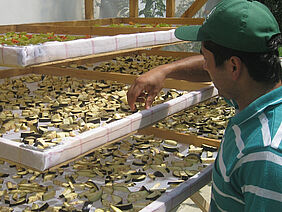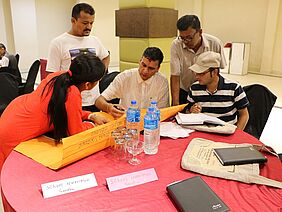Many people living in mountain regions of low and middle-income countries are vulnerable to food and nutrition insecurity. Traditional mountain diets tend to depend heavily on starchy food, with low levels of key micronutrients, causing deficiencies particularly amongst women and children. In addition, affordability and access to diverse foods is increasingly challenged by climate change, affecting both agricultural production and the state of infrastructure. To improve food and nutrition security in mountain regions, a peer-reviewed article recently published in the Mountain Research and Development journal reveals that nutrition-sensitive agriculture can offer a pathway to achieving this. This conclusion is drawn from insights gained in the Nutrition in Mountain Agro-ecosystems (NMA) project, implemented by IFOAM – Organics International, Helvetas Swiss Intercooperation, and the Research Institute of Organic Agriculture (FiBL).
Micro-interventions implemented
The implementation of 132 micro-interventions in Ethiopia, Kyrgyzstan, Nepal, Pakistan and Peru showed that activities aiming to improve year-round access to affordable, safe, diverse, and nutritious foods should be combined with awareness creation activities to stimulate behavioral change and increase consumption of ingredients that constitute a healthy diet. Micro-interventions generate tangible benefits for local communities and also exemplify how nutrition-sensitive agriculture can be implemented, replicated and scaled up. Micro-intervention activities ranged from the introduction of new solar drier technology in Kyrgyzstan, school nutrition gardens in Nepal, low-cost greenhouses in Pakistan and Peru to mushroom production in Ethiopia. All micro-interventions involved awareness-raising activities highlighting the importance of dietary diversity and how it can be promoted through agro-ecological production and consumption practices shared at community gatherings, on radio programs as well as online.
Improved dietary diversity scores
For each micro-intervention, a baseline and endline survey was conducted, from which dietary diversity scores were calculated as a qualitative measure of food consumption that reflects access to a variety of foods. Differences in scores reflect changes achieved through the micro-interventions. Additional focus group discussions confirmed that participants’ understanding of dietary diversity has increased and that micro-interventions were the driver of this change.
Way forward
Thanks to a further project phase, replication of several successful activities will now be in focus e.g. school gardening in Nepal, tunnel farming in Pakistan, solar driers in Kyrgyzstan, mushroom farming in Ethiopia, and guinea pig raising in Peru. The scaling up of successful interventions has started with a call for competitive proposals from organizations, institutions or private people eager to invest further in these practices and reach out to a high number of villages / communities or municipalities. Thanks to continued support from the Swiss Agency for Development and Cooperation (SDC), the NMA project continues. In its second phase, lasting until June 2021, it expands its focus to more countries in the mountain regions of Himalaya (Nepal, India), the Hindukush (Pakistan), Pamir and Tian Shan (Kyrgyzstan, Tajikistan), the African Highlands (Ethiopia), and the Andes (Peru and Ecuador).
What is nutrition-sensitive agriculture?
Nutrition-sensitive agriculture addresses both the production and consumption dimensions of food and nutrition security by promoting the design and implementation of sustainable farming systems to improve nutrition outcomes, especially by diversifying the range of food sources, processing methods, and marketing channels.
Nutrition in Mountain Agro-ecosystems (NMA) project at a glance
The main objective of the Nutrition in Mountain Agro-ecosystems (NMA) project is to set in place, replicate and scale up sustainable agriculture practices to promote improved nutrition-enhancing practices in poor mountain regions.
Funded by the Swiss Agency for Development and Cooperation (SDC), Section Global Programme Food Security (GPFS), the implementation of NMA is mandated to IFOAM - Organics International with its consortium partners FiBL and Helvetas Swiss Intercooperation.
Further information
Contact
Thomas Bernet, FiBL Switzerland
Links
- bioone.org: Online article "Nutrition-Sensitive Agriculture Interventions in Mountain Areas - Lessons Learned From a 5-Country Project to Upscale Best Practices"
- ifoam.bio: The project "Nutrition in Mountain Agro-ecosystems (NMA)"
- organicwithoutboundaries.bio: Blog text





